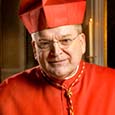Discipline and Doctrine: Law in the Service of Truth and Love (Part III)
- CARDINAL RAYMOND BURKE
In his 1990 Address to the Roman Rota (the Pope's ordinary court of appeal), Pope Saint John Paul II describes the inseparability of sound pastoral practice and canonical discipline.
The Intrinsic Connection between Canonical Discipline and Pastoral Practice
In his 1990 Address to the Roman Rota (the Pope's ordinary court of appeal), Pope Saint John Paul II describes the inseparability of sound pastoral practice and canonical discipline:
The juridical and the pastoral dimensions are united inseparably in the Church, pilgrim on this earth. Above all, they are in harmony because of their common goal—the salvation of souls. But there is more. In effect, juridical-canonical activity is pastoral by its very nature. It constitutes a special participation in the mission of Christ, the shepherd (pastore), and consists in bringing into reality the order of intra-ecclesial justice willed by Christ himself. Pastoral work, in its turn, while extending far beyond juridical aspects alone, always includes a dimension of justice. In fact, it would be impossible to lead souls toward the kingdom of heaven without that minimum of love and prudence that is found in the commitment to seeing to it that the law and the rights of all in the Church are observed faithfully.6
As Pope John Paul II makes clear, it is impossible to speak of exercising the virtue of love within the Church, if we do not practice the virtue of justice which is the minimum required for a relationship of love.
The saintly Pontiff then confronts directly the pronounced tendency at the time, which has strongly returned in our time, to put in opposition pastoral concerns and juridical or disciplinary requirements. He underlines the insidious nature of such an opposition for the life of the Church:
It follows from this that any opposition between the pastoral and the juridical dimensions is deceptive. It is not true that, to be more pastoral, the law should become less juridical. Surely, the very many expressions of that flexibility that have always marked canon law, precisely for pastoral reasons, must be kept in mind and applied. But the demands of justice must be respected also; they may be superseded because of that flexibility, but never denied. In the Church, true justice, enlivened by charity and tempered by equity, always merits the descriptive adjective pastoral. There can be no exercise of pastoral charity that does not take account, first of all, of pastoral justice.7
The clear instruction of Pope Saint John Paul II is most timely in the present growing crisis regarding Church discipline. It expresses what has been the constant teaching and practice of the Church regarding mercy and justice, pastoral care and disciplinary integrity.
In Service of Justice in Love
It is my hope that this small reflection is of some assistance to you in understanding the actual state of canon law in the Church. In a time of crisis, both within the Church and in civil society, it is essential that our service of justice be firmly rooted in the truth of our life in Christ in the Church, Who is the Good Shepherd teaching, sanctifying, and disciplining us in the Church. There is, therefore, no aspect of the perennial discipline of the Church which can be overlooked or even contradicted without compromising the integrity of the pastoral care exercised in the person of Christ, Head and Shepherd of the flock in every time and place.
Through the merits of Christ the Judge of the Living and of the Dead and through the intercession of the Blessed Virgin Mary, His Mother and the Mirror of His Justice, may each of us remain faithful and steadfast in serving the justice which is the minimal but irreplaceable condition of the love of God and of our neighbor.
✠
6. Papal Allocutions to the Roman Rota 1939-2011, ed. William H. Woestman (Ottawa: Faculty of Canon Law, Saint Paul University, 2011), pp. 210–211, no. 4. [Hereafter, Allocutions].
7. Allocutions, p. 211, no. 4.
 This is J. Fraser Field, Founder of CERC. I hope you appreciated this piece. We curate these articles especially for believers like you.
This is J. Fraser Field, Founder of CERC. I hope you appreciated this piece. We curate these articles especially for believers like you.
Please show your appreciation by making a $3 donation. CERC is entirely reader supported.

Acknowledgement
 Cardinal Raymond Burke. "Discipline and Doctrine: Law in the Service of Truth and Love (Part III)." cardinalburke.com (May 9, 2023).
Cardinal Raymond Burke. "Discipline and Doctrine: Law in the Service of Truth and Love (Part III)." cardinalburke.com (May 9, 2023).
Reprinted with permission from the author.
The Author
Raymond Leo Cardinal Burke is an American Cardinal Prelate of the Roman Catholic Church.
Copyright © 2023 Cardinal Raymond Burke


